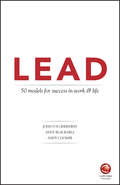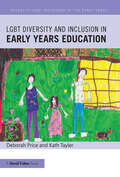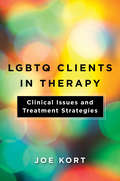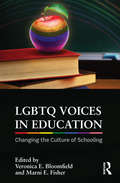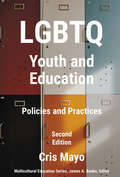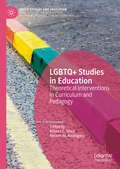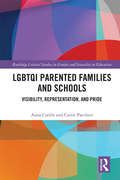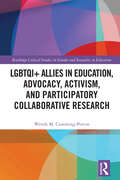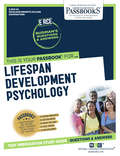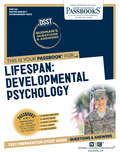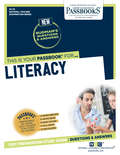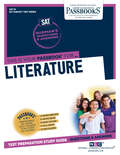- Table View
- List View
LEAD: 50 Models For Success In Work And Life
by John Greenway Andy Blacknell Andy CoombeLEAD will develop you as a leader in a dynamic way that goes to the heart of your purpose and dreams. It takes you well beyond traditional, fixed planning processes, which are out of date as soon as the ink dries, or the temporary ‘high’ of a leadership development day or two. It helps you recognise the complexity of the challenges you face and equips you to navigate these effectively and flexibly. . . because life is not a straight line. LEAD equips you with enduring principles, inspiring stories and practical tools to: ● Map the journeys that you want to make in work and life ● Navigate through life’s twists and turns to success ● Grow yourself and others as leaders Its style is like that of the best coach whose sole aim is to enable you to find your purpose and to thrive. The authors bring their own fresh perspectives and the very best leadership thinking and practice. LEAD should be your constant companion, always within reach to coach, challenge and cheer you on. LEAD will help you to be clearer and more confident - to fulfil your potential and succeed in work and life.
LEGO Man in Space: A True Story
by Mara ShaughnessyThe true story of two boys who launched a Lego Man into space! With over 3 million views on YouTube and covered by almost every major news outlet in the world, the story of how two boys launched a Lego man 80,000 feet
LEGO Man in Space: A True Story
by Mara ShaughnessyThe true story of two boys who launched a LEGO man into space! With over 3 million views on YouTube and covered by almost every major news outlet in the world, the story of how two boys, Matthew Ho and Asad Muhammad, launched a LEGO man 80,000 feet into space using a weather balloon, a homemade parachute, and a video camera is truly an inspirational story for all ages. Now you can follow along with the plucky little &“Legonaut&” as he explains just how he became the very first LEGO Man in Space. With bright, original illustrations and loads of fun space facts and activities, kids everywhere will go wild for this true tale of a Legonaut legend and his space adventure. A triumph of science and curiosity, this children&’s book is the first and only book to tell the story of how Mathew Ho and Asad Muhammad accomplished this amazing feat.LEGO Man in Space includes a resource guide for teachers with science activities, classroom crafts and games, and more!
LEGO Still Life with Bricks: The Art of Everyday Play
by Lydia Ortiz Michelle ClairCapturing the boundless creativity of the LEGO® brand, this colorful book recreates objects and scenes from everyday life using LEGO bricks. Transforming handfuls of bricks into minty toothpaste, eggs and bacon, lush houseplants, and more, LEGO Still Life reimagines the mundane and sparks playfulness in everyday life.Featuring unique, clever, and captivating original art, these deceptively simple but meticulously executed images are full of surprise and delight—and remind us that the world around us is, too.• Recreates commonplace scenes from everyday life using LEGO® bricks• Creatively reimagines the everyday objects and scenes• Presented without text, these clever images speak for themselves, offering joy, surprise, and creativity on each spreadLEGO Still Life is the perfect gift for LEGO lovers and art lovers alike.Watch LEGO bricks transform into everyday objects, turning the humdrum into a delightful surprise.• Great not only for LEGO fans who are feeling nostalgic, but for anyone who appreciates quirky art projects and creative spirit • This is a book that makes you look twice and enjoy the artful effort.• Perfect for fans of The Art of the Brick: A Life in LEGO by Nathan Sawaya, The Greatest Brick Builds: Amazing Creations in LEGO by Nathan Sawaya, and Beautiful LEGO by Mike Doyle
LGBT Diversity and Inclusion in Early Years Education (Diversity and Inclusion in the Early Years)
by Deborah Price Kath TaylerChildren and families come in all shapes and sizes, as do members of staff. LGBT Diversity and Inclusion in Early Years Education will support practitioners in thinking about LGBT issues in relation to their early years practice. It examines the history of equalities legislation and the diversity of families with LGBT members alongside pragmatic advice to ensure that all children, families and staff feel welcomed and celebrated in the early years setting. This book offers realistic advice and practical guidance, which results from years of first-hand experience in the early years sector. The chapters explore key topics such as: A brief history of legislation in the UK in regard to LGBT diversity Good practice with children and families LGBT diversity in an early years work environment Resourcing for equality Including case studies, reading lists and links to useful websites and organisations, this book will be valuable reading for all early years practitioners and students that want to promote an inclusive environment for the children in their care.
LGBT+ Youth and Emerging Technologies in Southeast Asia: Designing for Wellbeing (Perspectives on Children and Young People #14)
by Benjamin HanckelThis book investigates the ways in which emerging digital technologies are shaping and changing the worlds of sexuality and gender diverse youth in Southeast Asia. Primarily focused on the Philippines, Indonesia, Singapore, Thailand, and Malaysia, the book examines the potential of digital technologies to enhance wellbeing in and across these contexts. Drawing on multi-site ethnographic field research, interviews, survey data, and online content analysis, the book examines the design and use of websites and content by and for LGBT+ youth. The book innovatively interrogates the design of transnational digital wellbeing initiatives, alongside the digital practices of those the technologies are designed for. It illustrates not only the (im)possibilities of technological design, but also the capacity for design to participate in what Hanckel calls ‘(trans)national digital wellbeing’ processes. He asks us to consider the ways that global technologies are contextual—a paradox that is explored throughout the book. The analysis extends important discussions in youth research, contributing to a greater understanding of how LGBT+ youth are engaging new technologies to participate in identity-making, health and wellbeing, as well as political action. It also considers implications for digital wellbeing and digital health promotion efforts globally with young people who experience marginalisation. In doing so the book makes a critical contribution to understanding the ways that transnational digital interventions get deployed and (at times) incorporated into youth practices.
LGBT-Q Teachers, Civil Partnership and Same-Sex Marriage: The Ambivalences of Legitimacy (Routledge Critical Studies in Gender and Sexuality in Education)
by Aoife NearyThe introduction of legislative structures for same-sex relationships provides a new lens for grappling with the politics of sexuality in schools and society. The emergence of civil partnership and same-sex marriage in Ireland brings to the fore international debates around public intimacy, religion in the public sphere, secularism and the politics of sexuality equality. Building on queer, feminist and affect theory in innovative ways, this book offers insight into the everyday negotiations of LGBT-Q teachers as they operate between and across the intersecting fields of education, religion and LGBT-Q politics. Neary illustrates the complexity of negotiating personal and professional identities for LGBT-Q teachers.
LGBTQ Clients in Therapy: Clinical Issues And Treatment Strategies
by Joe KortAll the answers clinicians need to work effectively with LGBTQ clients. A therapist who treats LGBTQ clients often must be more than “gay friendly.” Clinical experience, scientific research, and cultural understanding are advancing rapidly, and the task of being LGBTQ informed is ever-changing in today's world. This book covers topics such as how to avoid making the common mistake of believing that "a couple is a couple," thus treating LGBTQ couples the same as their heterosexual counterparts; how to treat clients struggling in "mixed" orientation marriages and relationships (straight and LGBTQ spouses in the same couple); and how to work with all clients who have non-heteronormative sexual behaviors and practices. Perhaps most importantly, the book discusses covert cultural sexual abuse (the trauma suffered from having to suppress one's own sexual and gender identity) as well as the difficult process of coming out to family and friends. A therapist's job is to help clients and their identities through their own lens and not anyone else's—especially the therapist's. The gay affirmative principles put forward in this book will help you build a stronger relationship with your LGBTQ clients and become the go-to therapist in your area.
LGBTQ Leadership in Higher Education
by Raymond E. CrossmanWhy does queer leadership matter? In this book, the first of its kind, 15 LGBTQ presidents and chancellors in higher education provide insight into their experiences and highlight the importance of queer leadership for the academy and the world.Prior to this century, there were few known gay or lesbian presidents in North American higher education. Mary Emma Wooley, president of Mount Holyoke College from 1901 to 1937, is documented because her life on campus with her partner, Jeanette Marks, is described in their love letters, which have been recently curated. Jacquelyn A. Mattfeld, president of Barnard College from 1976 to 1980, rarely receives recognition for braving sexism, heterosexism, and homophobia during her presidency. Theodora J. Kalikow, president of University of Maine Farmington from 1994 to 2012, bridges the few early examples to the era of contributors to this volume. In LGBTQ Leadership in Higher Education, Raymond Crossman brings together 15 currently serving or retired LGBTQ presidents and chancellors in higher education to explain why, to whom, and how LGBTQ leadership matters. Writing from the perspective of their lived and specific experiences as LGBTQ presidents, these current and former leaders consider whether there is something distinctive about LGBTQ leadership. They also attempt to draw insights and principles from their personal stories. In addition, the book considers a profound question: Is being queer a superpower for these leaders, something they manage as part of their intersectional identities, or is it just another attribute of accomplished leaders? In essays ranging across 12 topics, including intersectionality, mentorship, feminism, self-care, coming out, heteronormativity, and partners and spouses, the authors address why LGBTQ leadership matters at this moment, and more broadly, why diversity, inclusion, and equity in leadership are important to meet today's challenges for higher education and human rights. The first book on this topic, LGBTQ Leadership in Higher Education simultaneously archives a moment that is the forerunner to new, enormous, and necessary evolutions in the practice of leadership.Contributors: Terry L. Allison, Peggy Apple, Nancy "Rusty" Barceló, Raymond E. Crossman, Erika Endrijonas, James Gandre, Richard J. Helldobler, Susan E. Henking, Ralph J. Hexter, Theodora J. Kalikow, Daniel López, Jr., Charles R. Middleton, DeRionne Pollard, Katherine Hancock Ragsdale, Regina Stanback Stroud, Boris Thomas, Karen M. Whitney
LGBTQ Voices in Education: Changing the Culture of Schooling
by Veronica E. Bloomfield Marni E. FisherLGBTQ Voices in Education: Changing the Culture of Schooling addresses the ways in which teachers can meet the needs of LGBTQ students and improve the culture surrounding gender, sexuality, and identity issues in formal learning environments. Written by experts from a variety of backgrounds including educational foundations, leadership, cultural studies, literacy, criminology, theology, media assessment, and more, these chapters are designed to help educators find the inspiration and support they need to become allies and advocates of queer students, whose safety, well-being, and academic performance are regularly and often systemically threatened. Emphasizing socially just curricula, supportive school climates, and transformative educational practices, this innovative book is applicable to K-12, college-level, and graduate settings, and beyond.
LGBTQ Youth and Education: Policies and Practices
by Cris MayoThis second edition is essential reading for educators and other school community members who are navigating the increasingly complicated laws and legal rulings related to LGBTQ students, employees, and community members. It combines historical, contemporary, theoretical, and practical information to help educators address exclusionary practices in schools related to gender identity, sexuality, racism, sexism, and other forms of bias that shape student experiences. <P><P>To enable educators to better understand their obligations to students in relation to policy, staff training, daily school climate, pedagogy, and curriculum, the author has extensively revised this popular text to include updated information on the impact of same-sex marriage legalization and increasing federal recognition of transgender student rights. And because the legal terrain regarding transgender youth has been especially volatile, Mayo provides strategies educators can use to maintain ethical trans-inclusive teaching, even when local regulations appear to impede transgender inclusivity.
LGBTQ+ Studies in Education: Theoretical Interventions in Curriculum and Pedagogy (Queer Studies and Education)
by Nelson M. Rodriguez Robert C. MizziThis edited volume utilizes critical perspectives other than/or in addition to LGBTQ+ studies to facilitate knowledge-building on pedagogical and curricular approaches to LGBTQ+ studies within the context and concerns of promoting LGBTQ+ inclusivity across various educational spaces. Chapters include: intersectional analysis, pedagogies of discomfort, critical theory/critical peace education, critical literacy studies, social class theory, public pedagogy studies, critical theory/critical pedagogy, Indigenous/decolonizing studies, critical posthumanist theory, personal narratives as pedagogy, and critical heterosexuality studies, among other perspectives. Through this collection, the editors and their authors demonstrate that other perspectives (in addition to LGBTQ+ studies) can be equally helpful to teaching practices and curricula that advance LGBTQ+ inclusivity and knowledge production.
LGBTQI Parented Families and Schools: Visibility, Representation, and Pride (Routledge Critical Studies in Gender and Sexuality in Education)
by Anna Carlile Carrie PaechterExploring the experiences of LGBTQI+ parents and their children and their relationship with schools, this book illuminates how these families work with schools, and how schools do, or do not, support children of LGBTQI parents. Based on empirical research and making space for the voices of both parents and children, the research extends beyond previous studies of gay and lesbian parenting to include bisexual, transgender, queer, non-binary, and intersex parents. The authors consider the influence of pressure groups, school inspection frameworks, legislation, and the media, and examine the ways in which some schools are working to become more inclusive.
LGBTQI+ Allies in Education, Advocacy, Activism, and Participatory Collaborative Research (Routledge Critical Studies in Gender and Sexuality in Education)
by Wendy M. Cumming-PotvinThis topical book explores the ally perspective in advocating for Lesbian, Gay, Bi-sexual, Transgender, Queer and Inter-sex (LGBTQI+) human rights across American, Canadian, and Australian educational contexts. This book aims to clarify the terms and dynamics of mobilizing heterosexual and cisgender privilege in the interests of promoting safe, welcoming and inclusive educational communities for all stake holders, particularly those students who self- identify as LGBTQI+. By highlighting concrete examples of allies engaged in participatory collaborative research, and by investigating the historical and theoretical dimensions of ally work more generally, this volume presents a comprehensive research account of allies’ role in education, advocacy and activism. This book will benefit researchers, academics, and educators in higher education with an interest in gender and sexuality, the sociology of education and schools and schooling more broadly. Those specifically interested in gender studies, as well as the politics of higher education, will also benefit from this book.
LIFE Jesus: Who Do You Say That I Am?
by The Editors of LIFEThe editors of LIFE Magazine present LIFE Jesus.
LIFE Moses: How His Teachings Shaped the World
by The Editors of LIFEMoses-the man, the myth, and the mysteryAs a story of hope and liberation, the Exodus has influenced people and religions all over the world-including our American forefathers. But who was the prophet of the Israelites who led God's chosen people from slavery to freedom? Discover in this new Special Edition, LIFE Moses: How His Teachings Shaped the World. What of the many miracles that were attributed to him? Did they actually occur, and if so, how? Were they freak occurrences of nature or God's divine intervention? Moses addresses all of these question and more. Filled with distinctive art from throughout history and glowing photographs of the many sites as they are today, Moses examines his journey and the Exodus through the eyes of the editors of LIFE. In the tradition of Walking the Bible, LIFE Moses combines the latest archaeological research with words of scripture to provide you with a nuanced portrait of that time. Discover the man, the myth, the mystery-and an inspiration-in Moses.
LIFE SPAN DEVELOPMENTAL PSYCHOLOGY: Passbooks Study Guide (Excelsior/Regents College Examination Series #Pep-64)
by National Learning CorporationThe Excelsior/Regents College Examinations (E/RCE) offer you an opportunity to obtain recognition for college-level learning and consists of exams designed to demonstrate achievement and mastery of various college-level subjects, such as the Arts and Sciences, Business, Criminal Justice, Education, Health and Nursing. The E/RCE Life Span Developmental Psychology Passbook® prepares you by sharpening knowledge of the skills and concepts necessary to succeed on the upcoming exam and the college courses that follow. It provides a series of informational texts as well as hundreds of questions and answers in the areas that will likely be covered on your upcoming exam.
LIFESPAN: Passbooks Study Guide (DANTES Subject Standardized Tests (DSST) #Dantes-64)
by National Learning CorporationThe DSST Subject Standardized Tests are comprehensive college and graduate level examinations given by the Armed Forces, colleges and graduate schools. These exams enable students to earn college credit for what they have learned through self-study, on the job, or by other non-traditional means. The DSST Lifespan: Developmental Psychology Passbook® prepares candidates for the DSST exam, which enables schools to award credit for knowledge acquired outside the normal classroom environment. It provides a series of informational texts as well as hundreds of questions and answers in the areas that will likely be covered on your upcoming exam, including but not limited to: models and theories of lifespan development; ethical issues; biological development; cognition and language; and more.
LIFT!: Going up if teaching gets you down (Practical Teaching)
by David GumbrellThis could be just the LIFT you need in your teaching career!Teachers are a workforce under pressure and many are leaving the profession due to stress and anxiety. This practical, strategy-led book is suitable for trainees, teachers and school leaders, and can be used to promote both individual reflection or a wider staff discussion around the themes of resilience and well-being.It offers a sustainable and manageable approach in bite-sized chunks to help you regularly nurture yourself and change those perspectives or daily habits that can be unhelpful for you and your pupils. By proactively managing moods, emotions and situations you can make a real difference to your day and to the outcomes of your teaching.The book can be dipped into and can be used time and again to refresh your outlook and boost your resilience with regular inputs of positive, constructive advice.
LINEAR ALGEBRA: Passbooks Study Guide (DANTES Subject Standardized Tests (DSST))
by National Learning CorporationThe DSST Subject Standardized Tests are comprehensive college and graduate level examinations given by the Armed Forces, colleges and graduate schools. These exams enable students to earn college credit for what they have learned through self-study, on the job, or by other non-traditional means. The DSST Linear Algebra Passbook® prepares candidates for the DSST exam, which enables schools to award credit for knowledge acquired outside the normal classroom environment. It provides a series of informational texts as well as hundreds of questions and answers in the areas that will likely be covered on your upcoming exam.
LITERACY: Passbooks Study Guide (National Teacher Examination Series (NTE) #Nt-49)
by National Learning CorporationThe National Teacher/PRAXIS Examinations are designed to provide objective measurement of the knowledge, skills and abilities required of teachers. The Passbook® for the Literacy exam provides hundreds of multiple-choice questions in the areas that will likely be covered on your upcoming certification test.
LITERARY CRITICISM ENGLISH Paper - I Andhra University SDE M.A. (Final)
by Prof. Ila Rao Prof. A.V.V. Narasimha Swamy Prof. D.Lakshmana Rao Prof. K. Viswanadham Prof. C.L.L JayapradaThis is the prescribed material for students pursuing MA English at School of Distance Education Andhra University for the subject of Literary Criticism in Final year
LITERATURE IN ENGLISH: Passbooks Study Guide (Graduate Record Examination Series (GRE))
by National Learning CorporationThe Graduate Record Examinations, developed by Education Testing Service, are required for admission to graduate school. The GRE Literature in English Passbook® prepares you by sharpening the skills and abilities necessary to succeed on your upcoming exam, providing hundreds of questions and answers in the areas that will likely be covered on your test.
LITERATURE: Passbooks Study Guide (College Board SAT Subject Test Series #Upft-14)
by National Learning CorporationSAT Subject Tests, developed by the College Board, are required by many colleges and universities as part of their admission requirements. The SAT Literature Passbook® prepares you for your test by allowing you to take practice exams modeled after the real SAT Subject Test. It provides hundreds of reading comprehension questions and answers that require knowledge of basic literary terminology and understanding of literary concepts. The book is comprised of dozens of reading passages similar to the ones you will find on your upcoming exam, including but not limited to: prose passages (fictional works, essays, etc.), poetry, excerpts, American literature, English literature and Renaissance works.
